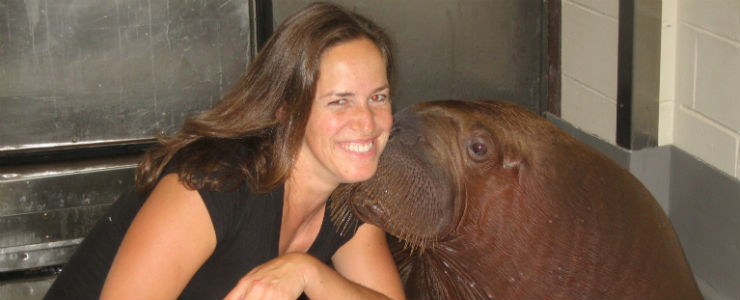Marine Vertebrate Biology
The Marine Vertebrate Biology cluster is one of the largest in the institute and includes researchers who study a broad range of marine mammals and birds including dolphins, whales, sea otters, seals, sea lions, peregrine falcons, eagles, and a variety of marine birds. This area of research was one of the first established within the Institute and the scientists in this group have had great success and are internationally recognized for developing unique field and lab techniques to investigate wild populations of marine mammals, marine birds, and raptors. These birds and animals are difficult to study in the wild because they migrate over very large areas and typically live in remote and often inaccessible environments.
Their research efforts utilize innovative technologies to study energetics and physiology, as well as hearing and vision of captive animals in the marine mammal pool complex at the Coastal Science Campus. These scientists also work in remote locations (the Antarctica and Arctic, for example) where environmental conditions are often harsh and challenging, but where unique opportunities exist to study foraging and diving behavior of wild animals outfitted with time-depth, temperature and salinity recorders, satellite telemetry devices and critter cams.
Faculty (Professors and Adjuncts) and Professional Researchers affiliated with the Marine Vertebrate Biology Cluster Group:
Caroline Casey, Assistant Researcher: Animal behavior, including both signal production and reception among animals competing for resources and how social relationships and familiarity among individuals influence signal architecture
Megan Cimino, Assistant Researcher: Biological and physical factors that drive species demographics, distributions and movements. Utilize sensing technologies to understand climate change effects, biogeographic patterns, and predator-prey dynamics. Main focus is on penguins, other seabirds and their prey in the Antarctic and California Current system.
Daniel Costa, IMS Director and Distinguished Professor of Ecology & Evolutionary Biology: Physiological ecology of marine mammals and birds.
Donald Croll, Professor of Ecology & Evolutionary Biology: Ecology and conservation of islands and seabirds.
Ari Friedlaender, Professor of Ocean Sciences: Foraging ecology and behavior of marine vertebrates and understanding the impacts of anthropogenic disturbance.
Rachel Holser, Assistant Researcher: Connecting ocean conditions to the behavior and success of marine mammal populations. Particularly interested in variability in behavior, what drives and maintains that variability, and what the ecological consequences are for a population.
Shawn Noren, Researcher: Comparative physiological ecology of vertebrates, specifically, on developmental biochemistry, physiology, morphology, and whole animal energetics, with an emphasis on the respiratory, cardiovascular, and musculature systems.
Rita Mehta, Professor of Ecology & Evolutionary Biology: Comparative marine physiology, morphological, physiological, and behavioral evolution; mechanisms guiding diversification in vertebrate clades whose members have evolved an elongate and limb-reduced (or complete loss) body plan such as snakes, anguilliform fishes, and other eel-like vertebrates.
Colleen Reichmuth, Research Biologist, Adjunct: Pinniped cognition and perception, including cross-modal (auditory-visual) emergent learning in sea lions and assessment hearing in marine mammals.
Terrie Williams, Professor of Ecology & Evolutionary Biology: Large mammal physiology, bioenergetics, exercise and environmental physiology.

